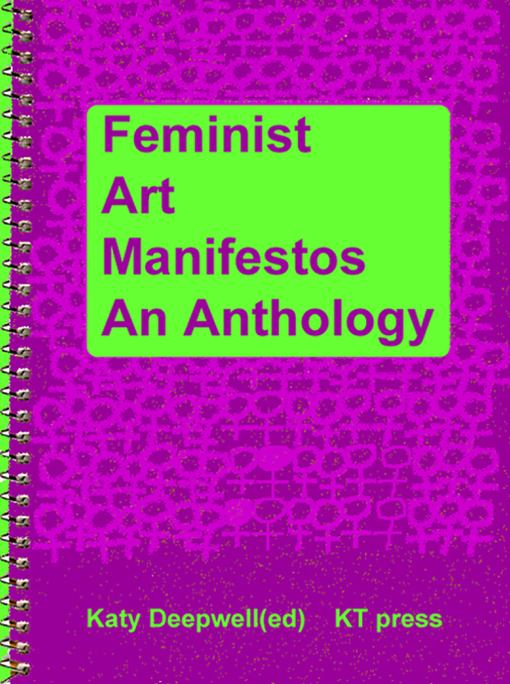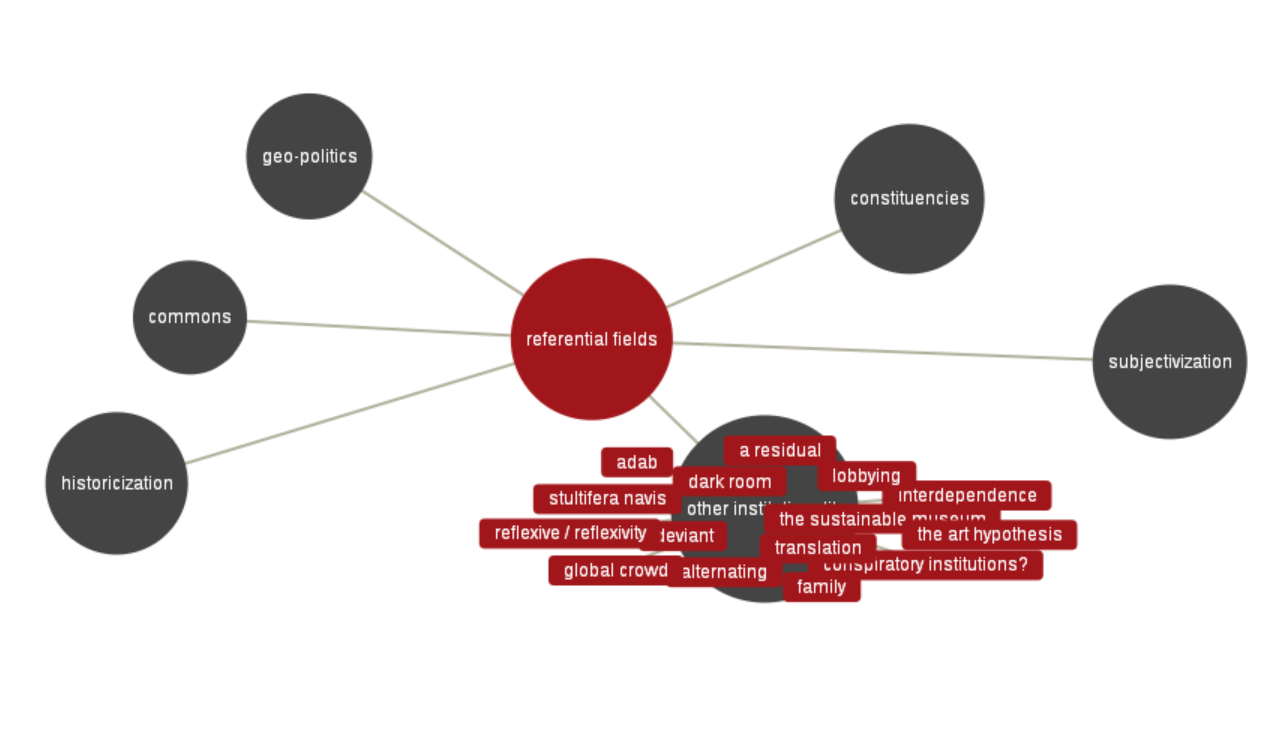Katy Deepwell (ed.): Feminist Art Manifestos: An Anthology (2014)
Filed under book | Tags: · art, art theory, contemporary art, feminism, manifesto

“What is a manifesto? A political programme, a declaration, a definitive statement of belief. Neither institutional mission statement, nor religious dogma; neither a poem, nor a book. As a form of literature, manifestos occupy a specific place in the history of public discourse as a means to communicate radical ideas. Distributed as often ephemeral documents, as leaflets or pamphlets in political campaigns or as announcements of the formation of new parties or new avant-gardes, manifestos above all declare what its authors are for and against, and ask people who read them to join them, to understand, to share these ideas. The feminist art manifestos in this anthology do all of these things as they explore the potential and possibilities of women’s cultural production as visual artists.”
Publisher KT press, London, 2014
ISBN 9780992693435
132 pages
Reviews: Susan Ballard and Agnieszka Golda (Australian Feminist Studies, 2015), Monika Kaiser (FKW, 2015, DE).
Publisher (new edition, 2022)
Comment (0)Christoph Cox, Jenny Jaskey, Suhail Malik (eds.): Realism Materialism Art (2015)
Filed under book | Tags: · aesthetics, art theory, materialism, matter, object, object-oriented ontology, philosophy, realism, representation, speculative realism, technology, theory

“Realism Materialism Art (RMA) introduces a diverse selection of new realist and materialist philosophies and examines their ramifications on the arts. Encompassing neo-materialist theories, object-oriented ontologies, and neo-rationalist philosophies, RMA serves as a primer on ‘speculative realism,’ considering its conceptual innovations as spurs to artistic thinking and practice and beyond. Despite their differences, these philosophical positions propose that thought can and does think outside itself, and that reality can be known without its being shaped by and for human comprehension. Today’s realisms and materialisms explicitly challenge many of the dominant assumptions of cultural practice and theoretical inquiry, opening up new domains of research and artistic inquiry.”
Contributions by Armen Avanessian, Elie Ayache, Amanda Beech, Ray Brassier, Mikko Canini, Diana Coole, Christoph Cox, Manuel DeLanda, Diedrich Diederichsen, Tristan Garcia, Iain Hamilton Grant, Elizabeth Grosz, Boris Groys, Graham Harman, Terry Horgan, Jenny Jaskey, Katerina Kolozova, James Ladyman, François Laruelle, Nathan Lee, Suhail Malik, Quentin Meillassoux, Reza Negarestani, John Ó Maoilearca, Trevor Paglen, Luciana Parisi, Matthew Poole, Matjaž Potrč, João Ribas, Matthew Ritchie, Alicia Ritson, Susan Schuppli, Steven Shaviro, Nick Srnicek, Achim Szepanski, Eugene Thacker, McKenzie Wark, Andy Weir.
Publisher Center for Curatorial Studies, Bard College, NY, and Sternberg Press, Berlin, 2015
ISBN 9783956791260, 3956791266
403 pages
Reviews: Ilse van Rijn (Open, 2015), Hatty Nestor (Review31, n.d.).
PDF (14 MB)
Comment (0)Glossary of Common Knowledge (2017)
Filed under book | Tags: · art theory, commons, contemporary art, geopolitics, glossary, history, politics, subjectivation, subjectivity, theory

The Glossary of Common Knowledge is a research project by MG+MSUM, Ljubljana, in the frame of L’Internationale, aiming to negotiate various positions, contexts and local narratives about contemporary art. The glossary entries were produced through six seminars (2014-17), each focusing on one selected referential field: historicization, subjectivization, geo-politics, other institutionality, and commons. The resulting website now functions as an open platform accepting new contributions.
Fields and terms:
Historicization: archive, constellation, emancipation, temporally embodied sound, estrangement, heterochronia, humanism, intuition, pathological fracture, phantom (pain), reconstruction, self-historicization, temporalities, tendencies in art, the contemporary.
Subjectivization: creleasure, dancing as insurrectional practice, decolonize, evidence, fragility, interest, kapwa, loser, over-identification, radical imagination, self-determination, self-representation, on subjectivization, the subject, travesti, unrest.
Geo-politics: agitational visual language, alignment, catastrophe, eurasia, event, global resistance, institutional geopolitical strategies, migrancy, non-aligned movement, pandemic, postsocialism, south, tudigong, god of the land, white space.
Constituencies: agency, autonomy, biotope, bureaucratisation, collaboration / co-labour, construction, the continuity-form and counter-continuity, de-professionalization, intervenor, labour, ñande / ore, the eternal network / la fête permanente, the rest is missing.
Commons: to baffle, basic income, the brotherhood & unity highway, constituent power of the common, corrected slogan, data asymmetry , friendship, heterotopian homonymy, institution, noosphere, palimpsest, rog, self-management, solidarity, theft.
Other institutionality: a residual, adab, alternating, conspiratory institutions?, dark room, deviant, family, global crowd, interdependence, lobbying, reflexive / reflexivity, stultifera navis, the sustainable museum, the art hypothesis, translation.
Curated by Zdenka Badovinac, Bojana Piškur and Jesús Carrillo (MNCARS) in collaboration with L’Internationale, et al
Publisher MG+MSUM, Ljubljana, 2017
HTML (on the website of MG+MSUM)
HTML (on the website of L’Internationale, added on 2020-4-12)
Seminar recordings structured by terms discussed

